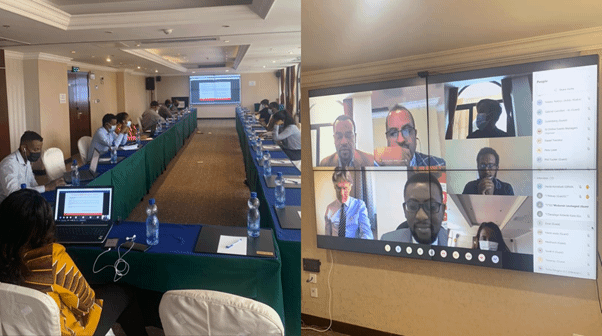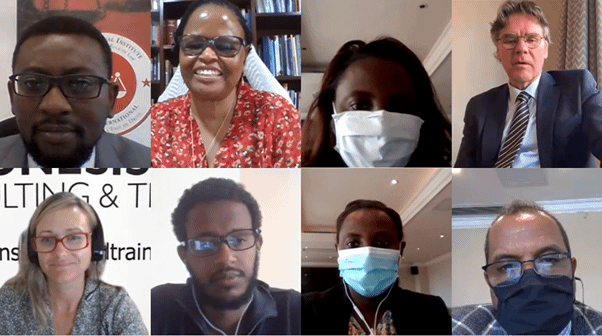
In April 2021, the IIJ convened a second national-level capacity-building workshop for Ethiopian practitioners under the IIJ Juvenile Justice Initiative. The workshop was delivered using a hybrid training model that included both online and in-person training elements. The workshop brought together 16 practitioners, including prosecutors, public defenders, judges, corrections officials and other relevant stakeholders, along with the U.S. Department of Justice’s OPDAT Resident Legal Advisor (RLA) and other staff from the U.S. Embassy in Ethiopia.
The workshop’s main objectives were to further enhance the skills and collaboration of senior-level practitioners to ensure justice for children in a counter-terrorism context and finalise the draft cross-sectoral recommendations presented during the first workshop in December 2020. The training was tailored for Ethiopia, building on the framework of international norms and standards on children rights, and good practices articulated in the GCTF's Neuchâtel Memorandum on Good Practices for Juvenile Justice in a Counterterrorism Context.
The workshop addressed the role of the police in dealing with children in terrorism cases, including specific tools to protect the best interests of the child from the time of arrest of a child suspect. Practitioners discussed the process of assessing a child suspect’s vulnerability, conducting a successful investigative interview, and strategies to ensure early representation in a case. Presenters emphasised the need to keep child suspects in facilities separate from adults because of the heightened risk of abuse and manipulation children can experience when detained with an adult prison population. Practitioners also benefitted from sharing experiences on the importance of establishing alternatives to incarceration such as referrals to vocational training or remand homes, and how such alternatives can be more cost-effective than detention.
Practitioners also discussed ways defence lawyers can compel investigators and judges to influence the enforcement of bail. Other topics discussed included: using non-stigmatising terminologies when referring to child terrorism suspects; protecting their privacy rights; providing child-friendly courtrooms; sensitising and training law enforcement in appropriate investigative methods; and creating more juvenile centres dedicated to rehabilitation and reintegration programmes.
On the second day, practitioners worked through a fact-pattern exercise that put into practical context the roles of stakeholders in ensuring justice for children in a counter-terrorism context. They also shared invaluable input on the Draft Recommendations to Improve Ethiopia’s Juvenile Justice Efforts. Their input will be integrated into a final version that will serve as the basis of a comprehensive, cross-sectoral framework for dealing with juvenile cases in Ethiopia, developed in conjunction with the relevant national stakeholders.
For more information on this workshop or the IIJ Juvenile Justice Initiative, please contact Programme Manager Emerson Cachon.


